- Home
- Michael Thomas Ford
Z Page 2
Z Read online
Page 2
“Issues one through twelve and your Spider Queen action figure,” Emily countered.
“No way!” Josh said, now genuinely upset. “I saved up for that for six months. They only made two hundred of them, and mine’s number twenty-two. And it’s not an action figure. It’s a handmade, one-twenty-eighth-scale articulated model.”
Emily turned around. “Hey, Mom!” she called out.
“Wait!” Josh said.
Emily looked at him. “Deal?” she asked.
“I’ll give you the novels and do your homework for two months.”
Emily rolled her eyes. “Please,” she said. “I want to get good grades. Mom!” she yelled again. “Josh is—”
“Okay!” Josh cut her off. “You can have the Cybooks and the Spider Queen. It’s a deal.”
Emily looked at him, beaming. “Transfer the codes,” she said.
Josh shook his head. “Not until after dinner,” he said. “I want to make sure you don’t squeal.”
“Like I would go back on a deal,” Emily said, sounding offended.
Josh knew she was right. Emily drove a hard bargain, but she always did what she agreed to. Still, he couldn’t let her win so easily. He stared back, saying nothing.
“Fine,” Emily relented. “But right after dinner.”
She left the room. Josh turned his computer screen back on and saw the message he’d been dreading: YOU HAVE BEEN DEMOTED ONE LEVEL. REPORT TO THE BRIEFING ROOM FOR YOUR NEXT ASSIGNMENT.
“One level!” Josh groaned. After almost a year of playing, he had recently reached Torcher First Class. Now he was back to being a Torcher Second Class. It would take months to get his rank back. His only consolation was that Firecracker would also be demoted for getting turned. Still, it didn’t make him feel any better.
“Great,” he said as he got up to go downstairs. “Back to the minor leagues.”
2
“You gave her what?” Firecracker looked at Josh as if his friend had completely lost his mind. They were sitting in biology class, waiting for the late bell to ring.
“I had to,” Josh objected. “She was going to tell my folks, and you know how they feel about the game. If they knew I was playing again, they’d put a block on my computer so all I could access is educational sites. No more gaming. At all.”
Firecracker ran a hand through his red hair. “I guess you kinda deserve it,” he said. “You did almost torch me.”
“That’s my job,” Josh reminded him. “Besides, no one told you to go and get bit. What happened, anyway?”
Firecracker shook his head. “Man, it was Charlie again. He tricked me into following him down to the morgue. When I got there, he was hiding inside one of the meat freezers so I couldn’t smell him. Jumped out from behind a side of beef that was hanging in there and got me.”
“That guy is good,” said Josh. “What level is he now, thirty-six or something?”
“I don’t even know,” Firecracker answered. “Whatever he is, he’s the best player I’ve ever seen.”
“Too bad he plays a z,” said Josh.
“Yeah,” Firecracker agreed. “I don’t get that. Why would he want to play a meatbag?” He spoke the last word as if he were spitting something nasty-tasting out of his mouth.
Josh shrugged. He didn’t understand it either. Most players wanted to be Torchers. But Charlie played the other side. He’d started playing only a few months before Josh and Firecracker did, but quickly shot up the rankings and was now one of the top zombie players. Even Josh had to admit that playing a z was more difficult than playing a Torcher. You had to be really good at tricking the other players and leading them into traps where you could bite them. And Charlie was a master of it. Yet no one knew much about him. I’d sure like to meet him, thought Josh as Mrs. Hotchkiss entered the room.
“All right,” said Mrs. Hotchkiss. “Let’s get started.” She punched a button on the control panel on her desk, and the lights in the room dimmed. A moment later a three-dimensional holographic image of a brain appeared in the air in front of each desk. It rotated slowly, giving the students a view of all sides.
“The human brain is a complex organ,” the teacher said. “But, according to the triune brain theory first proposed by neurologist Paul MacLean way back in the 1950s, it comprises three basic sections.”
She typed on her keypad, and one section of the brain—the largest—turned blue. “This is the neocortex,” she explained. “This part of the brain is responsible for things such as language development, abstract thought, and consciousness.”
She continued on to the second section, which was within the brain, surrounded by the neocortex. “This is the limbic system,” she explained as the area turned yellow. “It’s responsible for memory storage and emotions.”
The hologram of the brain had been transferred to Josh’s NoteTaker unit, and as Mrs. Hotchkiss spoke, the information was updated on his screen. Since Josh could always look at it later, he didn’t listen too closely.
The final area, an oddly shaped section deep within the brain, turned green. It reminded Josh of a flower on a stalk.
“And this,” Mrs. Hotchkiss said, “is the most primitive part of the brain. It’s called the R-complex or, more commonly, the reptilian brain.”
“As in lizards?” Marcus Pell asked, earning him laughs from his classmates.
“Actually, yes,” the teacher confirmed. “In reptiles the R-complex makes up almost all of the brain, controlling basic functions such as body temperature, heart rate, and breathing. It does the same for us, although thanks to the other parts of our brains, most of us are slightly more advanced than lizards.”
Again most of the class laughed. Josh, however, drew on the page of his NoteTaker, using the stylus to make a series of spirals. Biology was one of his least favorite classes. As far as he was concerned, it was interesting only when they were dissecting holofrogs or doing cloning experiments. Plus, Mrs. Hotchkiss’s voice always made him sleepy.
“I bring this up because I understand you’re studying the zombie war in Mr. Sumpana’s history class,” said his teacher. “Do any of you know the science behind zombiism?”
Josh was suddenly interested. No one raised a hand, but he could see that the whole class was paying attention. Even Firecracker, in the row ahead of Josh, was sitting up and listening.
“Most of you probably know that the zombie epidemic began with a new strain of the common flu virus,” Mrs. Hotchkiss said. Her fingers moved over her keypad, and a small red image appeared beside the brain. It was circular, with hundreds of tiny bumps on it. It spun slowly.
“We’ve all had the flu at one time or another,” the teacher said. “You know the symptoms: sneezing, fever, feeling tired. The zombie flu was the same. That’s why at first nobody knew how dangerous it was. With the first cases, it took several weeks for the more severe symptoms to appear, and by then it was too late.”
Suddenly the holographic virus penetrated the smallest area of the brain, which began to glow red. As Josh watched, the reptilian portion of the brain grew in size while the other two sections shrank.
“The zombie virus attacked the reptilian brain,” explained Mrs. Hotchkiss, “making it grow larger. At the same time, it caused the other two brain areas to shrink. As the reptilian brain took over control of the body, the infected person lost the ability to think rationally and to make judgments based on right and wrong. Instead infected people began to act more and more impulsively, until eventually the only things that were important to them were eating and survival.”
A girl in the front row raised her hand. “I thought zombies were the living dead,” she said.
“Yes and no,” Mrs. Hotchkiss answered. “As the zombie flu virus attacked the neocortex of the brain, infected people lost the ability to speak coherently. In addition, they developed a great tolerance for pain. They seemed not to be affected by injuries that would be devastating to you and me.”
“You mean they couldn’t be kil
led?” someone asked.
“Not easily,” said Mrs. Hotchkiss. “In addition to affecting the brain, the virus had a peculiar effect on the blood. It became thicker and coagulated more easily. Wounds didn’t bleed as much, so a zombie could be stabbed or shot and survive. Some even lost limbs but didn’t bleed to death as we would, because their blood clotted so quickly. Because of this, it was first assumed that the virus killed the infected person and then somehow reanimated the corpse. In reality, those infected with the zombie flu did not die first. They simply became zombies because their brains were attacked by the virus, and it destroyed the most human parts and let the primitive part take over.”
“But you just said ‘yes and no,'” Josh reminded her.
“They were alive in the sense that they breathed and moved and had heartbeats,” the teacher said. “But their memories and emotions were gone. Their ability to feel was destroyed. They didn’t think in any way we would consider human. But technically, yes, they were alive.”
“Why didn’t they just give them a shot or something?” Josh was surprised to hear Firecracker ask the question. He almost never spoke in class.
“That’s a good question,” Mrs. Hotchkiss answered. “Doctors didn’t give them a vaccine because they didn’t have one. The flu virus is a very simple one, but that’s also what makes it difficult to fight. It mutates very rapidly when it’s attacked, which means that what works for one form of the virus might not work for another. In the case of zombie flu, none of the vaccines they tried worked, at least not quickly enough to save those who were already infected.”
“But we get zombie flu shots now,” said Josh. “When we’re born. So they came up with something, right?”
Mrs. Hotchkiss nodded. “There’s a preventative vaccine now,” she said. “It’s based on the most common strain of the zombie flu virus.”
“But there could be other kinds, couldn’t there?” asked Firecracker.
“Theoretically, yes,” said the teacher. “However, there hasn’t been a documented case of zombie flu infection in over fifteen years. The possibility of a new strain finding its way into the general population is almost nonexistent. In other words, Mr. McPherson, you don’t have to worry about turning into a zombie anytime soon.”
Firecracker grinned. “Too bad,” he said. “It sounds like fun.”
The class laughed, but Mrs. Hotchkiss shook her head. “It was not fun, Mr. McPherson,” she said, her voice serious. “None of you have seen a real zombie. But I have. Most people my age have. Your parents probably have. Those who were infected with the virus suffered horribly. The only consolation for those of us who saw them suffer was that by the time they turned, they had stopped being human. They didn’t know what they were.”
“Why did they torch them?”
Josh’s attention was brought back to the class by the question. It had come from Elizabeth Stalin, who sat right behind him.
Mrs. Hotchkiss hesitated a moment. “The zombie flu virus was initially passed on through saliva,” she said. “A zombie would bite someone, and the virus would enter the person’s bloodstream. Once it was in the blood, the virus could then be passed on through that. If someone had an open cut—or any kind of wound that exposed the body to potential infection—coming into contact with zombie blood was dangerous. It was feared that the virus might become airborne next, which would have been disastrous. So it was decided that the least risky and most efficient way to destroy the virus was to burn the zombies.”
“But wouldn’t that really hurt?” someone asked.
Again Mrs. Hotchkiss took some time before answering. “By that point the infected people were functioning solely on primitive reactions,” she said. “Almost like puppets being controlled by strings that were being pulled by their reptilian brains. They most likely didn’t know what was happening.”
“Still, it must have hurt,” Elizabeth insisted. “They still had nerves and stuff.”
Firecracker turned around and looked at her. “Who cares?” he said. “They were meatbags, not people.”
“Yeah,” said another girl. “Besides, if people hadn’t burned the zombies, they would have turned a lot of other people into zombies.”
“The important thing is that we don’t have to worry about it anymore,” Mrs. Hotchkiss said. “As I said earlier, there hasn’t been a documented case since before you were born.”
Josh raised his hand. “Where did it come from?” he asked. “The virus, I mean.”
“Nobody really knows,” his teacher told him. “Most likely it was simply a very strong mutation. As you’ve seen, there was nothing supernatural about zombies. They were just people who got sick and essentially devolved into primitive life forms.”
“My uncle says the Russians did it,” Firecracker announced. “He says they wanted to wipe us out.”
“Then they didn’t do a very good job,” said Mrs. Hotchkiss. “Just as many people turned in Russia as did here. I think your uncle has been watching a little too much television.”
“He was a Torcher,” Firecracker said defensively. “He should know.”
“Yes,” said Mrs. Hotchkiss. “Well, I’m sure we’re all very thankful to him for his service. Now if you’ll access sequence 1872-A, this will show you how the zombie flu virus interrupted the messages sent from one part of the brain to the others. This is going to be on your test on Friday, so let’s go over it and see if there’s anything you don’t understand.”
Josh keyed the number into his NoteTaker and looked at the diagram that appeared on the screen. He listened as his teacher went over the various parts, but mostly he was thinking about his aunt Lucy, his mother’s sister. He’d never met her, but he’d seen pictures. She was really pretty, just like his mom. And she had turned into a zombie.
She was only sixteen when she got sick, one of the first in the country to get the virus. He’d heard the story several times from his mother, but they didn’t talk about it too much because it made his mother sad. And Josh didn’t talk about it with anyone else. Not even Firecracker knew. Josh wasn’t sure why he didn’t tell anyone. He wasn’t ashamed, exactly. Having a zombie in your family wasn’t the terrible thing it had once been; it just wasn’t something most people talked about.
I guess it doesn’t really make it any better to know that she was just sick, he thought. It was amazing that something as tiny as a virus could turn someone into a monster like that. But she probably didn’t even know it was happening, he told himself.
Mrs. Hotchkiss continued to talk about zombies, and for a change Josh listened to every word. When he heard the bell ring, he was actually disappointed that class was over. Reluctantly he gathered up his things and filed into the hallway along with everyone else. Firecracker caught up with him as he walked to his locker.
“You up for hunting reptile brains tonight?” he asked.
“You know I am,” said Josh.
“Excellent,” Firecracker said. “We’ve got some work to do if we want to get our rankings back.” He punched Josh hard in the shoulder. “And this time, try not to screw up.”
“Hey!” Josh protested. “You’re the one who got—” But Firecracker was already making his way upstairs to his next class.
“Bit!” Josh shouted after him. “You got bit!”
3
“All right, let’s do this.”
Josh spoke into the small microphone mounted inside his helmet as he prepared to play. He had already put on the interactive gloves that allowed him to move his character through the holographic landscape as if he were really there. When he looked through the lenses of his helmet, instead of his room he saw the front doors of the downtown public library building.
The creators of the game had mapped the entire city, and gamers could play in holographic recreations of every building, subway, and sewer. The zombie generator was random, so any place you went into could be infested with the creatures.
Josh leaned back in his chair and took a deep breath, a
llowing the sense stimulators in his helmet to kick in. They allowed him to feel, smell, and sometimes even taste things he came into contact with during the game. Of course some sensations—like zombie bites or the effects of torching—were blocked to prevent players from becoming overstimulated. Still, when those things happened in a game, the sounds and sights alone were enough to make a player imagine what it would feel like.
He knew he shouldn’t be playing, but he couldn’t resist. Torching was exciting. Hunting for z’s and wiping them out made him feel like a real soldier. He loved the way he got more and more tense as he searched for the zombies, the way his senses became so intensely focused as he worried about staying alive and saving the other humans. He especially liked the adrenaline rush that came when he finally found the z’s and torched them.
He looked to his right, where Firecracker stood checking the controls on his flamethrower. “Ready?” Josh asked.
“Let’s torch some meatbags,” Firecracker answered. He flipped the safety on his flamethrower, which erupted in a short burst of fire.
“Easy,” Josh warned him. “We don’t want to burn the place down.”
Josh pushed open the huge door, which swung inward with a groan, and he and Firecracker stepped into the cavernous lobby of the library. The marble floor stretched away into the darkness, while the ceiling towered four floors above them. Books, most of them torn apart, were strewn everywhere. A thick smear of blood ran the length of the circulation desk, as if a body had been dragged along it.
Josh followed the trail to the end, and saw the body of a woman crumpled among a pile of books. Firecracker approached the woman, his flamethrower held out in front of him. When he was a dozen feet away from her, he turned back to Josh. “She’s gone,” he said. “Well, her head is, and she’s not going anywhere without it.”
“Just leave her there,” Josh said. “We’ll clean up on the way out.”
Leaving the woman behind, he and Firecracker advanced deeper into the library. Josh listened for any sound of moaning or shuffling, but there was nothing. Then, all of a sudden, a figure burst from the shadows. Josh aimed his flamethrower at it, but a voice called out, “Don’t shoot! I’m human!”

 Jane Bites Back
Jane Bites Back Tangled Sheets
Tangled Sheets Z
Z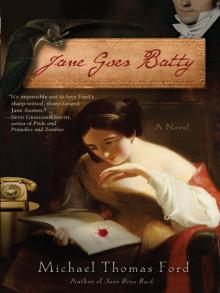 Jane Goes Batty
Jane Goes Batty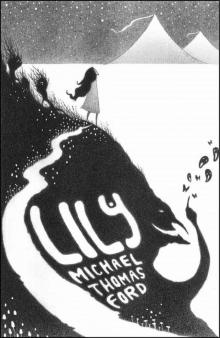 Lily
Lily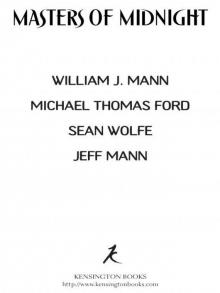 Masters of Midnight: Erotic Tales of the Vampire
Masters of Midnight: Erotic Tales of the Vampire The Road Home
The Road Home Midnight Thirsts: Erotic Tales of the Vampire
Midnight Thirsts: Erotic Tales of the Vampire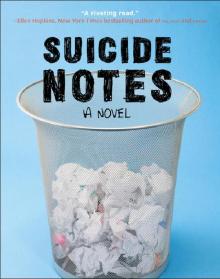 Suicide Notes
Suicide Notes Jane Goes Batty jb-2
Jane Goes Batty jb-2 Jane Vows Vengeance jb-3
Jane Vows Vengeance jb-3 Jane Fairfax 3 - Jane Vows Vengeance
Jane Fairfax 3 - Jane Vows Vengeance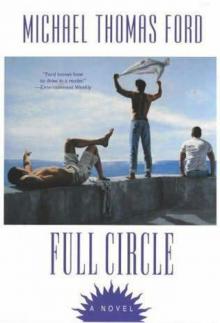 Michael Thomas Ford - Full Circle
Michael Thomas Ford - Full Circle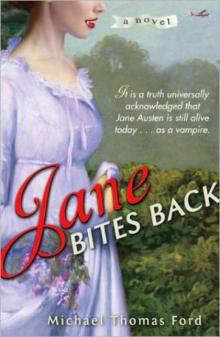 Jane Bites Back jb-1
Jane Bites Back jb-1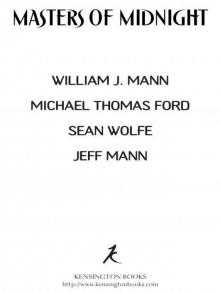 Masters of Midnight
Masters of Midnight